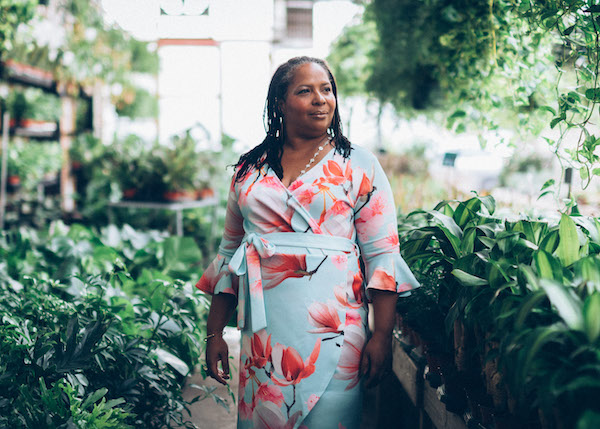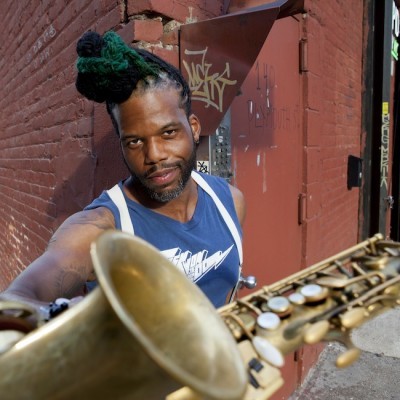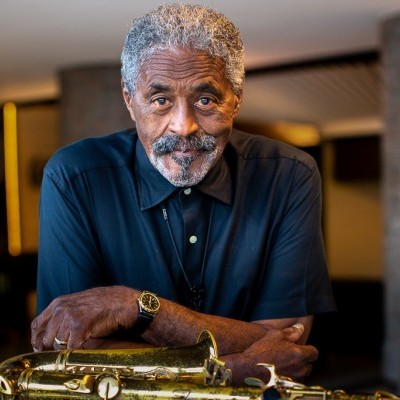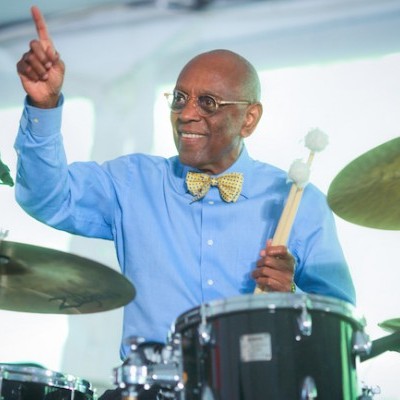Apr 2, 2024 12:59 PM
Saxophonist, Sonic Explorer Casey Benjamin Dies at 45
Casey Benjamin, the alto saxophonist, vocalist, keyboardist and producer who stamped his distinctive sounds on the…

Vocalist Fay Victor released a second album, We’ve Had Enough!, alongside her improvising ensemble through the ESP-Disk imprint.
(Photo: Chris Weiss)Despite being recorded prior to the coronavirus pandemic, vocalist Fay Victor’s We’ve Had Enough!, an album consisting primarily of live improvisations, speaks directly to our times.
It’s her second release with the SoundNoiseFunk ensemble (reedist Sam Newsome, guitarist Joe Morris and drummer Reggie Nicholson), and follows up the group’s 2018 Wet Robots (ESP-Disk), an earlier example of the troupe using improvisation to spark new ideas and feelings.
Victor—who refers to herself as a “FreeSongSinger” and grew up spending time in both Trinidad and New York—recently spoke to DownBeat about her latest album, as well as how improvisation endures as part of her “survival toolkit.”
The following has been edited for length and clarity.
Who is “we” in the title of your latest ESP-Disk release? And what do you mean by “enough?”
In a very specific way, I was referring to living through the Trump administration and his daily barrage of nonsense. So, that was the particular sentiment for the title. This was recorded live in October 2019, but I didn’t work on the record until June 2020—because of the pandemic. I listened to the rough mixes again shortly after George Floyd’s murder. So, the music took on a very different context. All of this combined with how the Trump administration exacerbated the feeling in certain people that they had this agency to constantly kill us.
“We” could evoke We Insist!, by Max Roach and Abbey Lincoln. But I’m wondering whether or not we can have both this ethic of freedom in music, as well as this necessary conversation in the music that speaks to what’s happening. How do you see those two practices fitting together?
I think this comes out of the Black experience, the necessity to figure out ways to be free. No matter the situation. Improvisation is so important to us because it’s been part of our survival toolkit. I feel that from a musical perspective, it’s important to say things that are real. I can connect this to the African American blues tradition, but I also connect it to my Caribbean ancestry. And I also connect this to the role of the calypsonian; in the past few years, I’ve really started to see how my work connects to that tradition. Traditionally, you’re informing an audience of things that are going on. The really amazing thing is that the audience is involved in how you organize that message. An amazing process, and the more I think about it, the more I understand it and the more I research it.
My uncle Franklin played steel pan, and he used to run away from home to play up in the hills of Laventille[, Trinidad]. Not that we were raised as some sort of Anglophiles, but class and status was important. I was born in New York City and I spent time in my childhood in Trinidad, which was great because I was in a Black space. Black people were in power—obviously, with problems like any political system in any country. But seeing people that looked like me in all strata of society made any opportunity for me just normal. Trinidadians are very proud; I saw that people there loved being from Trinidad. No one was pining to leave.
I was really struck by the first track, “Ritual.” Can you talk a little bit about where that came from and how it came together?
SoundNoiseFUNK is predominantly an improvising quartet. For this record, I composed a couple of pieces, “What’s Gone Wrong?” and “Wereld Worn.” In the live concert, we had a few long improvisations. And when I mixed We’ve Had Enough!, I broke up one of those improvisations, because there was this portion where we just went into this zone. ... [T]hat’s the kind of band this is. We end up in places maybe we never dreamed of. And in an organic way, so it was just in this place where I thought it felt like a ritual.
Does that happen a lot?
With this group, it happens a lot. We’ll start to play, and I bring in the text in the middle of what we’re doing. I don’t stop and say, “I’m going to present this text now.” It’s not announced in any way, until it enters the musical space. And that’s intentional, because the text becomes part of the improvisational texture too. ...
We’ve been together, I guess maybe two and a half years as a band. But I’ve known everyone individually for a while. [They’re] amazing to work with, and I think it’s really important to say that guitarist Joe Morris, soprano saxophonist Sam Newsome and drummer Reggie Nicholson are artists and composers in their own right. And each of them has a large palette of sound and experience to draw from. ... Because of everybody’s strengths, the music takes on its own form and direction, and the possibilities are endless. It’s a joy to get to create with them.
“Wereld Worn” is about climate change. When I think about climate change, I think about how human beings relate to nature, to the earth and—given what you’ve already expressed about living in Trinidad—to each other.
The text lays in the composition in a very unorthodox way. ... [E]nvironmental justice, for me it’s all coming from the same space as social and economic justice. I think about the long history of indigenous peoples being taken off their lands, displaced—most often to only make money off that land. The comedian George Carlin once said, “Honestly, when the planet gets tired of us, it’ll just shake us off.” The title “Wereld Worn,” is my way of saying the planet is tired. She is really tired, and there is going to be that moment, when she is gonna shake us off, just to save herself.
In indigenous and African traditions, making music and taking care of the environment go hand in hand.
That’s something I’ve thought about my whole life. Once I started to understand that history and understand for many of those First Nations communities how they thought about the land and thought about ownership. This whole idea of ownership is horrible. And this country was built on it; it’s the foundation of it. Ownership of us, ownership of land. Stealing land. Making deals, then rescinding treaties. Dupe, betray, steal and conquer. [But] there are forces at work that are so much bigger than us, and we all need to humble ourselves in recognition of that. Whatever name you choose to give that force—we are part of it, on a continuum. DB

Benjamin possessed a fluid, round sound on the alto saxophone, and he was often most recognizable by the layers of electronic effects that he put onto the instrument.
Apr 2, 2024 12:59 PM
Casey Benjamin, the alto saxophonist, vocalist, keyboardist and producer who stamped his distinctive sounds on the…

“He’s constructing intelligent musical sentences that connect seamlessly, which is the most important part of linear playing,” Charles McPherson said of alto saxophonist Sonny Red.
Feb 27, 2024 1:40 PM
“I might not have felt this way 30 to 40 years ago, but I’ve reached a point where I can hear value in what people…

Albert “Tootie” Heath (1935–2024) followed in the tradition of drummer Kenny Clarke, his idol.
Apr 5, 2024 10:28 AM
Albert “Tootie” Heath, a drummer of impeccable taste and time who was the youngest of three jazz-legend brothers…

“Both of us are quite grounded in the craft, the tradition and the harmonic sense,” Rosenwinkel said of his experience playing with Allen. “Yet I felt we shared something mystical as well.”
Mar 12, 2024 11:42 AM
“There are a few musicians you hear where, as somebody once said, the molecules in the room change. Geri was one of…

Henry Threadgill performs with Zooid at Big Ears in Knoxville, Tennessee.
Apr 9, 2024 11:30 AM
Big Ears, the annual four-day music celebration that first took place in 2009 in Knoxville, Tennessee, could well be…